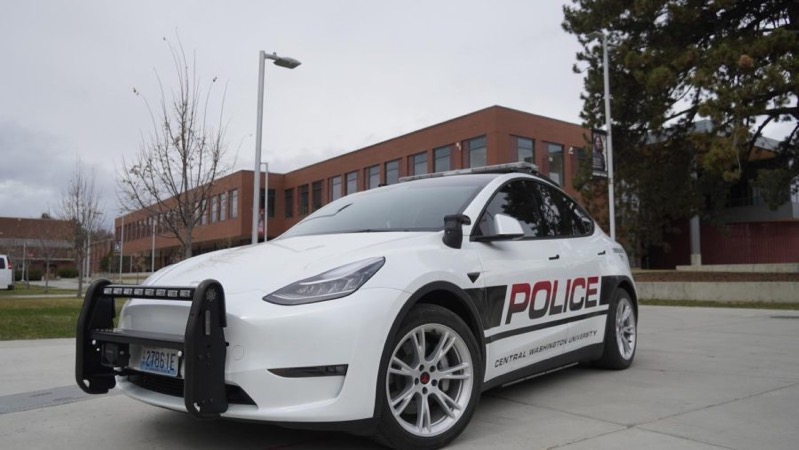
CWU Campus Police Tesla Model Y Patrol Car ‘Has Been Great’

The Central Washington University (CWU) campus police force took a step towards sustainability in 2021 by purchasing a long-range all-wheel-drive Tesla Model Y in an effort to reduce fuel costs and greenhouse gas emissions. CWU Police Chief Jason Berthon-Koch recently provided an update on the vehicle’s impact, reports The Observer.
“The Tesla has been great, and officers who drive it, they love it,” Berthon-Koch said. However, he noted some challenges faced by the officers, such as the Tesla’s battery running out in the middle of a scene and its quieter operation compared to traditional vehicles. It’s unclear the circumstances of how this exactly happened for the Tesla to run out charge, but interesting nonetheless. Did someone forget to charge the car?
“People don’t hear you like a normal car, and they have to be much more aware of where you’re going and where you’re driving,” he explained.
CWU Police added the Model Y patrol car back in December 2021.
Addressing the comfort of the vehicle, Berthon-Koch stressed its importance since officers spend long hours in their patrol cars. “It’s comfortable, it drives nice, and it’s quiet,” he said. However, he acknowledged that some officers may not fit comfortably in the vehicle due to their gear.
Responding to concerns about the Tesla being seen as a luxury vehicle, Berthon-Koch emphasized the investment was intended to support CWU’s sustainability goals and save money in the long run. “We chose to spend about $5,000 – $6,000 more right upfront to save $18,000 over five years,” he explained. The Tesla cost $56,783.91, including tax.
Berthon-Koch acknowledged that it’s difficult to measure the exact impact of the Tesla on fuel costs since the campus police department’s billing facilities only provide lump-sum amounts. The Tesla’s expenses were covered by the university Police and Parking budget.
In 2022, Governor Jay Inslee issued an executive order requiring most vehicles in Washington to have electric batteries by 2035. When asked about purchasing more Teslas to comply with the order, Berthon-Koch cited infrastructure challenges, saying, “We don’t have the infrastructure to charge it. We can’t bring more electric cars because… we do not have enough space for a second electric car at this time. It would be very cost prohibitive right now.” He also noted that the executive order might have an exemption for law enforcement.


Don’t have the infrastructure to charge it?! You can literally plug into any external outlet on campus.